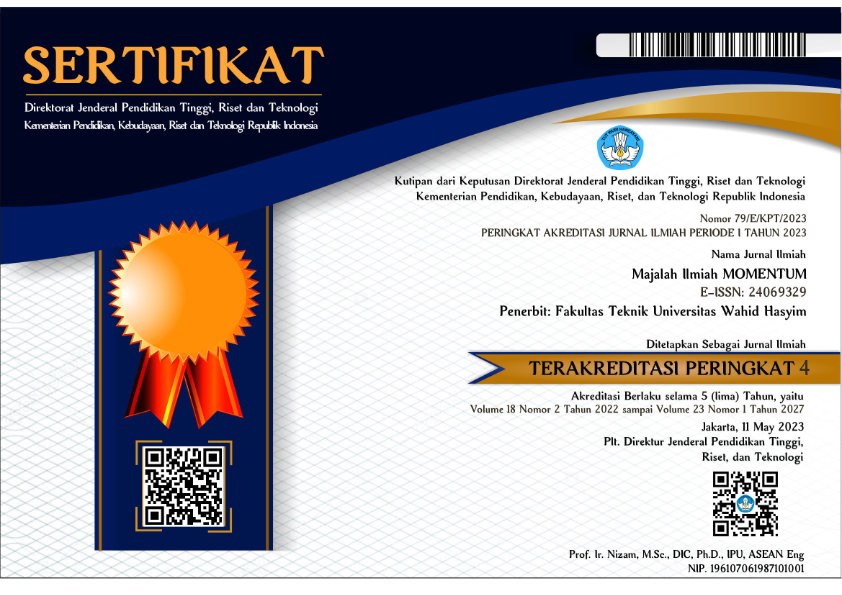PENGARUH PREKLORINASI TERHADAP PROSES START UP PENGOLAHAN LIMBAH CAIR TAPIOKA SISTEM ANAEROBIC BAFFLED REACTOR
DOI:
https://doi.org/10.36499/jim.v8i1.283Abstract
Tingginya kandungan sianida dalam limbah cair tapioka ditengarai dapatmenjadi inhibitor bagi proses pengolahan biologi. Keberadaan sianida dapat
mengakibatkan lebih lamanya waktu start up diperlukan untuk memperoleh
kultur bakteri dalam reaktor anaerob yang dapat bekerja stabil menurunkan
kadar polutan dan memperlambat proses dekomposisi senyawa organik. Kajian
mengenai pengaruh preklorinasi fresh feed terhadap proses start up operasi
Anaerobic Baffled Reactor 2 baffle perlu dilakukan. Penelitian ini terbagi
menjadi 3 tahapan utama yaitu inokulasi benih lumpur, preklorinasi fresh feed
dan operasi start up secara batch sampai tercapai kadar COD efluen yang
stabil. Hasil penelitian menunjukkan bahwa limbah cair tapioka dengan COD
influen 8000 mg/L dan pH 4,84 memerlukan 9 hari start up dengan COD efluen
954 mg/L. Peningkatan pH influen menjadi 8 mampu menghasilkan kadar COD
efluen 347 mg/L dalam 6 hari start up. Preklorinasi terhadap fresh feed dengan
penambahan kalsium hipoklorit berdasar perbandingan rasio mol klor dan
sianida sebesar 1:1 dapat mengurangi waktu start up hingga hanya menjadi 5
hari dan menurunnya COD efluen hingga mencapai kadar 230 mg/L.
Kata kunci: Tapioca wastewater; Anaerobic Baffled Reactor; start
up; prechlorination
Downloads
Published
Issue
Section
License
Authors who publish with this journal agree to the following terms:
The journal allow the authors to hold the copyright without restrictions and allow the authors to retain publishing rights without restrictions.
Authors retain copyright and grant the journal right of first publication with the work simultaneously licensed under a Creative Commons Attribution License that allows others to share the work with an acknowledgement of the work's authorship and initial publication in this journal.
Authors are able to enter into separate, additional contractual arrangements for the non-exclusive distribution of the journal's published version of the work (e.g., post it to an institutional repository or publish it in a book), with an acknowledgement of its initial publication in this journal.
Authors are permitted and encouraged to post their work online (e.g., in institutional repositories or on their website) prior to and during the submission process, as it can lead to productive exchanges, as well as earlier and greater citation of published work (See The Effect of Open Access).

This work is licensed under a Creative Commons Attribution 4.0 International License.







